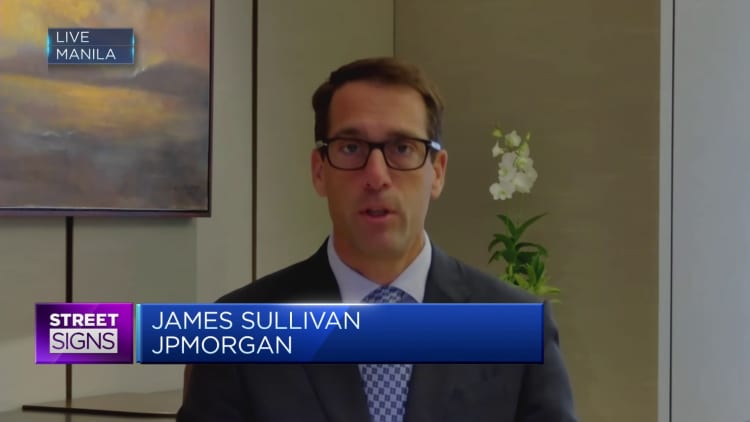Pictured here are self-driving robots in a China Duty Free Group’s warehouse in Haikou, Hainan, on March 20, 2023.
Vcg | Visual China Group | Getty Images
BEIJING — Asia’s competitive advantage was once cheap labor. Now, whether it’s China, India, or Japan, the region’s edge lies in industrial services, according to KKR’s heads of global and Asia macro in an October note.
This includes logistics, waste management, and data centers, the private equity giant said. “We believe there is both internal demand and an external element to this story.”
Their investment conclusion comes after a recent trip to Singapore, China, and Japan by New York-based Henry H. McVey, KKR Balance Sheet’s Chief Investment Officer and Head of Global Macro and Asset Allocation. Frances Lim, Managing Director and Head of Asia Macro and Asset Allocation based in Singapore, also joined the trip.
“We believe the demand for infrastructure and logistics could see even more significant acceleration in key markets such as India, China, Indonesia, the Philippines, Vietnam, and even Japan,” the KKR report stated.
According to the report, about 20% of KKR’s balance sheet is allocated to Asia, a region that is undergoing a longer-term shift requiring more fixed investment.
While the firm does not disclose specific country allocations, their major announced deals in the past two years have been in Japan. This includes the $2 billion acquisition of a Mitsubishi-backed real estate manager in spring 2022.

“I think there are two major trends in Japan,” said KKR’s Henry H. McVey in a recent interview. “One is automation and industrialization, involving a significant capex cycle that we haven’t seen in some time.”
McVey pointed to Japanese Prime Minister Fumio Kishida’s speech in New York last month, which highlighted record-breaking domestic investment exceeding 100 trillion yen ($673.58 billion) this year.
“If this leads to increased productivity, it can drive wage growth, which we haven’t experienced in a while,” McVey added, expressing his belief that Japan is emerging from deflation.
The other significant trend in Japan, according to McVey, is corporate reform resulting in higher shareholder returns.
After years of slow growth, Japan has become an attractive destination for international investors, especially amidst China’s uncertain conditions. In April, U.S. billionaire Warren Buffett visited Japan to announce further investments in major Japanese companies.
KKR completed its acquisition of Hitachi Transport System, a logistics company primarily focused on supply chains, in March. The company was renamed Logisteed. This year, KKR also made its first hotel investment in Japan by acquiring Hyatt Regency Tokyo through a deal with Gaw Capital Partners.
The KKR note stated, “Japan remains a must-own country, in our opinion,” further emphasizing that “Japan offers an attractive investment story that is not fully priced.”
As one of the world’s largest private equity firms, KKR manages assets totaling $519 billion as of June 30.
India
While McVey and Lim did not visit India during their recent trip, they confirmed a positive investment case for the country based on their discussions with corporate executives.
India has seen a 200% growth in public capital expenditure over the past four years, alongside surging exports, according to the report.
“We are finally witnessing investment in infrastructure, leading to greater productivity and benefiting both inflation control and economic growth,” said McVey. He also noted that in emerging markets, opportunities to benefit from rising per capita GDP trends are often more accessible through private investments rather than capital markets.

KKR recently announced the opening of a new office in Gurugram, India, and the appointment of Nisha Awasthi, formerly of BlackRock, as Managing Director. The firm anticipates hiring 150 new employees by early 2024.
This expansion in northern India complements KKR’s existing office in Mumbai. The firm also has offices in Beijing, Hong Kong, Seoul, Shanghai, Singapore, Sydney, and Tokyo within the Asia-Pacific region.
China
Although McVey’s last visit to India was in 2019, he and Lim wrote their October note following their third trip to China this year.
“Overall, it appears that growth in China is stabilizing,” they said, maintaining a 4.5% real GDP growth forecast for China next year, along with 1.9% inflation.
In July, KKR revealed that it had approximately $6 billion invested in China.
One of the key insights from McVey’s most recent trip to China was a better understanding of the changing economy, despite challenges in the real estate sector.
“There is a transition happening that may not be fully appreciated,” he pointed out. He highlighted that China’s digital economy and decarbonization efforts currently account for only
Denial of responsibility! Vigour Times is an automatic aggregator of Global media. In each content, the hyperlink to the primary source is specified. All trademarks belong to their rightful owners, and all materials to their authors. For any complaint, please reach us at – [email protected]. We will take necessary action within 24 hours.
Denial of responsibility! Vigour Times is an automatic aggregator of Global media. In each content, the hyperlink to the primary source is specified. All trademarks belong to their rightful owners, and all materials to their authors. For any complaint, please reach us at – [email protected]. We will take necessary action within 24 hours.


